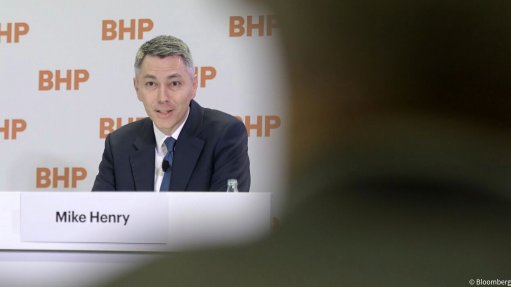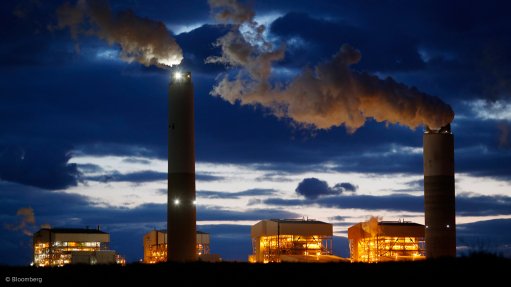Groundwater, wastewater must be secured to ensure water security


The Council for Scientific and Industrial Research (CSIR) Water Research Centre research group leader Patrick Hlabela
South Africa’s reliance on surface water, such as rivers and dams, has resulted in groundwater and wastewater resources being neglected.
However, growing water security concerns have made it critical for South Africa to invest in accessing and using both groundwater and wastewater as alternatives to diminishing surface water resources.
The Council for Scientific and Industrial Research (CSIR) Water Research Centre research group leader Patrick Hlabela explains that groundwater has not been fully exploited because it is expensive to access, especially at a small scale. Groundwater is also regarded as unsafe water and alternatives are often easier to exploit and manage.
Likewise, wastewater has potential to form part of the water resources mix in the country, however, water reuse, either through recycling or reclamation, has been minimal. As a result wastewater has been considered an inconvenience owing to its high management cost and potential to contaminate available water resources such as surface and groundwater.
Hlabela explains that, owing to the impact of anthropological activities, groundwater is no longer a pure resource that can be easily accessed and used without treatment, as these activities have potential to pollute the aquifers. Contaminated water from agricultural, industrial and domestic activities finds its way into the aquifers, thus polluting the groundwater. Mining activities release metals and other chemical pollutants into the groundwater rendering the water unusable.
Therefore, measures to protect groundwater are essential. Measures to protect it include treating contaminated surface water before it is discarded into the environment as well as ensuring minimum contact between groundwater and surface water.
Further, South Africa has not prioritised recycling or reclaiming wastewater, as only 2% to 12% of the wastewater is currently being reused. Hlabela expresses that the country is on the verge of serious water shortage. This calls for use of all possible water resources in the country including both groundwater and wastewater reuse.
CSIR Water Research Centre is working towards securing South Africa’s water resources through research that is geared towards innovative protection and promotion of the use of groundwater. Research is also focused on the recycling and reclamation of wastewater from industrial, domestic and mining use.
To reduce the impact of mining and industrial wastewater, CSIR is collaborating with other companies to develop technologies. Such technology will ensure that wastewater emanating from mining activities and other industrial processes is purified or treated prior to being returned to the environment if it cannot be reused for other activities. In cases where it is possible for the water to be reused, innovative and economically viable interventions are sought to turn the wastewater into a resource.
Solution Driven
The CSIR Water Research Centre evaluates the preservation and the security of water in the country by working with small, medium-sized and microenterprises (SMMEs) and other stakeholders to ensure that CSIR’s initiatives are robust and cover a large spectrum of use.
The CSIR is currently focusing research on decentralised and packaged wastewater treatment systems, as these systems have the advantage of low capital and operational cost.
Conventional infrastructure entails transporting water from the area where the pollution occurs to an area where the water can be treated which requires a complex network of pipelines. These pipeline networks require costly operation and maintenance. Owing to its complexity, this infrastructure is prone to malfunction and owing to the need for extensive maintenance, its operation becomes less effective with time. As a result, the systems become dilapidated, which subsequently becomes expensive to repair.
Decentralised wastewater treatment systems entail treating water at the point of source, which mitigates the challenges of conventional centralised systems. These systems are ideal for remote areas and institutions such as small communities, eco-parks, schools and prisons among others.
The CSIR has developed package plants, which can also be mobile systems, that are not expensive to erect and do not require a network of pipelines. This makes maintenance and operation easier and cheaper. The water can be treated at the source point to an acceptable quality which can then be discarded safely to the environment or reused for other purposes at the point of source.
The decentralised systems also reduce the backlog on centralised wastewater treatment systems which have already reached design capacity. It eliminates the need for sewage storage and disposal, which can be expensive for remote areas and institutions. The treated water can then be used for flushing or irrigation purposes as it meets the standards for wastewater treatment.
The system has not yet achieved potable water quality.
CSIR is also looking at revamping and improving existing conventional wastewater treatment systems that are not optimally functional as it is expensive to eradicate them completely.
“An ongoing research at the CSIR is looking at coming up with newer technologies, that will take advantage of the Fourth Industrial Revolution (4IR). This may involve interfacing newer technologies on the existing infrastructure or coming up with completely new technologies,” says Hlabela.
4IR technology can be used to manage the existing water and wastewater infrastructure in a manner that will increase both its longevity and efficacy. Relevant 4IR technologies have the potential to improve the operation and maintenance of the water and wastewater infrastructure, if used innovatively. This will lead to reduced dependance on manual and analogue methods for infrastructure operation and maintenance, which are prone to mistakes.
The lack of infrastructure malfunctioning prediction ability is a pitfall in the operation and maintenance of the water and wastewater infrastructure. This leads to the loss of high volumes of fresh water or spillages of wastewater before the leak or pipe burst is detected.
4IR technologies can be exploited and interfaced on the existing infrastructure in order to improve the turnaround time for attending to incidents. As an example, the CSIR is currently researching a dynamic hydraulic model that uses a network of sensors on water supply networks to pick up the potential buildup of pressure that can lead to pipe leakages or bursts. This technology is currently being optimised and will soon be demonstrated on a municipal water supply network.
Hlabela concludes by noting that, when it comes to water management systems, an important factor in its longevity is the communication between the infrastructure nodes, which is what 4IR technology is able to efficiently achieve.
Comments
Press Office
Announcements
What's On
Subscribe to improve your user experience...
Option 1 (equivalent of R125 a month):
Receive a weekly copy of Creamer Media's Engineering News & Mining Weekly magazine
(print copy for those in South Africa and e-magazine for those outside of South Africa)
Receive daily email newsletters
Access to full search results
Access archive of magazine back copies
Access to Projects in Progress
Access to ONE Research Report of your choice in PDF format
Option 2 (equivalent of R375 a month):
All benefits from Option 1
PLUS
Access to Creamer Media's Research Channel Africa for ALL Research Reports, in PDF format, on various industrial and mining sectors
including Electricity; Water; Energy Transition; Hydrogen; Roads, Rail and Ports; Coal; Gold; Platinum; Battery Metals; etc.
Already a subscriber?
Forgotten your password?
Receive weekly copy of Creamer Media's Engineering News & Mining Weekly magazine (print copy for those in South Africa and e-magazine for those outside of South Africa)
➕
Recieve daily email newsletters
➕
Access to full search results
➕
Access archive of magazine back copies
➕
Access to Projects in Progress
➕
Access to ONE Research Report of your choice in PDF format
RESEARCH CHANNEL AFRICA
R4500 (equivalent of R375 a month)
SUBSCRIBEAll benefits from Option 1
➕
Access to Creamer Media's Research Channel Africa for ALL Research Reports on various industrial and mining sectors, in PDF format, including on:
Electricity
➕
Water
➕
Energy Transition
➕
Hydrogen
➕
Roads, Rail and Ports
➕
Coal
➕
Gold
➕
Platinum
➕
Battery Metals
➕
etc.
Receive all benefits from Option 1 or Option 2 delivered to numerous people at your company
➕
Multiple User names and Passwords for simultaneous log-ins
➕
Intranet integration access to all in your organisation


















